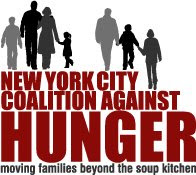12.6 million American children live in households without enough food. The stark reality of rising food costs, food shortages, and the limited gains in the recent Farm Bill will shape the next President's position in the fight against child hunger in the
NYCCAH Executive Director Joel Berg and Tom Freedman outlined a strategy for the next President to end child hunger. First, they argue, the government should make increasing enrollment in the Food Stamps and Women, Infants and Children (WIC) programs a priority by offering a common application for all supplemental nutrition programs, while simultaneously increasing accountability for agencies that administer nutrition programs. Access to these programs should be combined with universal school breakfasts, which have proven effective in increasing student performance, attendance and participation.
In order for nutrition programs to be effective, the government must also address the underlying barriers to effective anti-hunger policy. Berg and Freedman site the success of state anti-hunger and anti-poverty initiatives and encourage the federal government to award economic incentives to states who are successful in combating child hunger. The government must also renew its commitment to fighting poverty by instating a true living wage, exceeding the $7.25 an hour which will take affect next July.
Finally, the government can improve the quality and accessibility of anti-hunger and anti-poverty programs through strengthening its relationships with non-profits that offer sources for innovative policy and recommendations for needed improvements. The call to action is urgent, says Berg. “Americans are ready to come together and defeat a common challenge like child hunger. The problem is finding the political will to do it.”

No comments:
Post a Comment